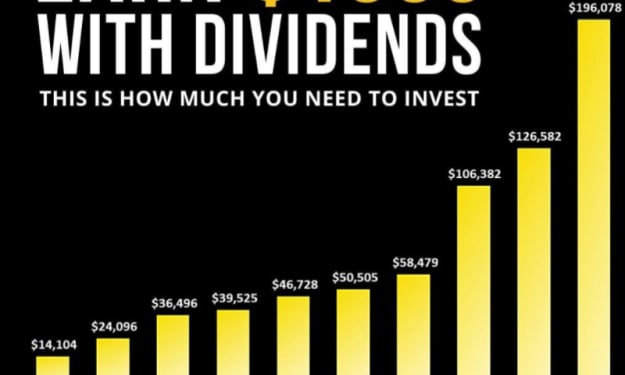
Having lots of income does not equal wealth. Just because you have a high income coming in this doesn't make you wealthy, especially if you are spending everything that you earn.
Wikipedia defines wealth as the abundance of valuable financial assets or physical possessions which can be converted into a form that can be used for transactions. Anyone can work towards saving and investing for the long term to build wealth.
Income vs Wealth
Most people confuse having lots of income as being wealthy. These are two distinctly different matters. Let's look at the image diagram of John and Adam, in this cover article. John makes 3 times more than Adam, however, Adam seems to be wealthier than John at the end of the day. Why is that?
Here's what distinguishes Adam from John:
- Adam has financial literacy.
- Adam has control over his finances.
Adam probably has an interest in personal finance, read some books like "Rich Dad Poor Dad", or "Think and Grow Rich". So he knows even if he isn't making that much money at the moment, he can grow his wealth if he focuses on different financial vehicles to get there.
How about John:
- John doesn't have financial literacy.
- He knows he makes a lot of money but isn't sure where all of it go before the end of the month.
- He is materialistic.
Why build wealth?
The thing about the income is it focuses on the short-term. It's how much you get for the now. On the other hand, wealth focuses on the long term. The money that you accumulated for your future.
Most people think that only if you have a lot of income can you build wealth, however, the truth is anyone can build wealth if they are broke and have little to start off with.
Even though short term luxury may make you feel rich today such as expensive cars, holidays, clothes etc you might feel differently as you mature in life and approach retirement with only little savings. We can all agree, no one wants to approach their own age, without any financial cushion to enjoy their retirement comfortable.
Hence, it is crucial to make the most out of building wealth when you are:
- young
- energetic
- have time on your side for money to compound
- mentally agile to learn financial literacy
- freedom to do as you please
The thing to remember with income is that it can vanish just as quickly as a changing tide due to a layoff, market change, or illness. Conversely, wealth is an inflow of cash that will be able to sustain a healthy financial future for yourself in years to come.
How can you build wealth?
1. Find out which investment vehicle you need to build wealth.
Most people that any investment vehicle can build the same wealth, but in reality, different investment vehicles build wealth differently. Eg, a start-up that goes public through IPO can make its founder hugely successful. Conversely, an employee using a job as an investment vehicle with no opportunities for career advancement and growth limits the amount of wealth that an employee makes.
It's important to be intentional with building wealth, as it doesn't happen by chance. Lot's of planning goes into it.
2. Find out where you stand financially
Before jumping right into just saving or investing, figure out where you stand financially so that you can move towards where you want to go next.
Calculating your net worth can be very helpful in giving you an idea of where you stand financially. This gives you mental clarity for things that you can and can't afford. Additionally, you can remedy the situation if your net worth is in the red.
Make a realistic budget that you can work with and stick with it.
3. Follow wise approaches to financial freedom
These include:
Having 3- 6 months emergency fund.
Pay down the high-interest debt that is more the 8–10% eg credit card debt, personal loan debt and other high-interest debts.
Get a job if you are unemployed.
4. Focus on the big 3 expenses which are rent/mortgage, food, and transportation.
It's good to figure out what you can do while maintaining your lifestyle.
- Pack your own meals at home. Cut out alcohol and unhealthy foods.
For example, cutting out weekly drinks from every week to once a month. Or buying foods and cooking them yourself as opposed to having takeaways every day.
- Find affordable accommodation.
Find a place that is safe while offering reasonable rent. This may include house sharing, or even sharing with a housemate.
You may even decide to Airbnb your room if you are going for a vacation.
Even finding a place with rent that is $100 less each month translates into $1,200 of savings each year.
- Manage transport
Try saving on transport if you can through carpooling. Next, using the bus as opposed to a taxi can save you a lot in the long run especially if you are frequently taking the taxi.
Getting a bus card or any bus saver scheme can be helpful as well in saving some extra coins.
5. Other things to consider
- Pay off debts.
You can either use the debt avalanche method or the debt snowball method.
With the debt snowball method, you pay off your debts from smallest balance to largest balance, regardless of interest rates.
In the debt avalanche method, you pay your debts from highest interest rate to lowest interest rate, regardless of balance.
- Refinance
Refinance a higher interest loan with a lower interest one.
You may want to check out refinancing companies to see which one is most suitable.
- Invest
Consider investing some money into a pension/ retirement savings fund. This ensures you have a pool of funds available when you retire.
This could be a Roth IRA, 401k, pension plan, private retirement scheme etc.
Invest in low-cost index funds, stocks, bonds, loan notes, real estate, alternative investments etc. Depending on whether you a conservative or aggressive investor you can adjust this depending on which part of the spectrum of an investor you are.
Conclusion
Having the right mindset to start early on is very important in where you end up in future. Being consistent is key although at times it may feel like a huge challenge to stay the course.
Even if your income is relatively low, you can still make progress towards wealth with smart spending choices.
Lastly, by having a solid foundation of wealth, you'll have more freedom and flexibility to pursue whatever you see fit. That's financial freedom!
----------------------------------------------------------------------------------------
If you would like to support my writing, please consider liking my story, subscribing, pledging and/or tipping. Thank you for reading!






Comments
There are no comments for this story
Be the first to respond and start the conversation.